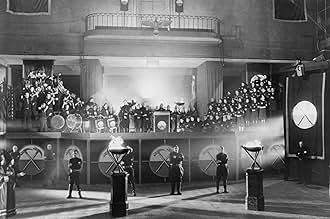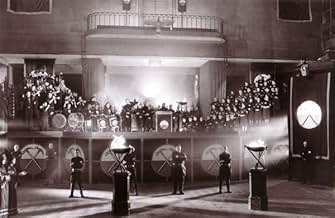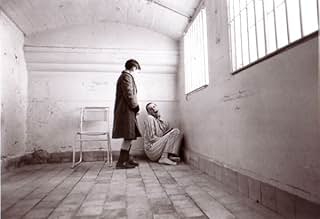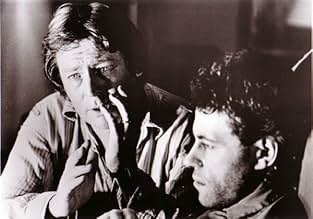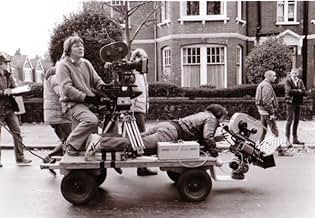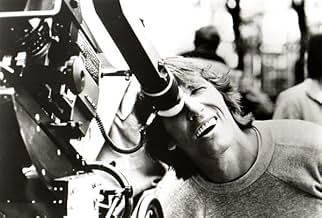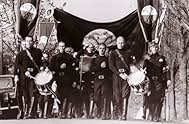Una rock star turbata scende nella follia in mezzo al suo isolamento fisico e sociale.Una rock star turbata scende nella follia in mezzo al suo isolamento fisico e sociale.Una rock star turbata scende nella follia in mezzo al suo isolamento fisico e sociale.
- Ha vinto 2 BAFTA Award
- 3 vittorie e 2 candidature totali
Margery Mason
- Teacher's Wife
- (as Marjorie Mason)
Recensioni in evidenza
I recently rented and re-watched Pink Floyd The Wall for the 200th time, and I had forgotten, over the years, why this is my favorite movie. Surprisingly, the reason it is so good has little to do with a rock star having a mental breakdown. Pink being a rock star is almost incidental to the real message of the film. It seems as if director Parker took the initial idea of Pink Floyd's album and ran away with it. The film serves less as a study of one celebrity individual, instead serving as a cinematic indictment of all of our worst aspects as human beings: cruelty, brutality, insanity, herd mentality, fascism--all the most negative traits of twentieth century man are splashed upon the movie screen, as if the Director was asking the audience "Why?" This is a film in rebellion against the status quo. Funny then, that it should be driven by the music of a major rock and roll band. But, all in all, that is besides the point. The film of the Wall begins and ends with scenes of oppression by authoritarian figures (police men, skinheads, teachers, etc.)It is almost as if the entire sub textual content of the film is drawing a parallel between the internal alienation of a single individual and the social and global alienation that fostered the cruelties of World War 2, the holocaust, ad infinitum. Pinks degeneration is the degeneration of Everyman, confronted by a world that is (still) spinning increasingly out of control, away from the light, further behind the wall of its own nihilistic will toward self-obliteration. The violence of the imagery, the final "Trial", and the psychic attack of the final montage of disturbing images (masked children put into a meat grinder, cartoon teachers becoming hammers, neo-Nazis on a rampage) as the scene fades into a blank grey wall, are grand, satirical, operatic "Theater of Cruelty" in a cinematic framework. But it is the final lyric (sung by a repulsive, animated "Judge") that puts the entire scope of this picture into focus: "I sentence you to be EXPOSED before your peers..." The Judge , of course, is not merely talking to the fictional "Pink", but to the viewers of the film, and well, the entire world, for all that, and again, the Director has, seemingly, high jacked the "rock opera" format, and used it as a vehicle to ask that ultimate question: why is mankind so mutually interested in its own self-destruction? Why do nations and civilized cultures slide easily into fascistic thinking? How many war orphans are we still, to this day, creating?
I am not, now, a fan of Pink Floyd's music, although all of the music in this film is beyond excellent. Oddly enough, I am the farthest thing from the dope-smoking "hippy" that is supposed to be a Pink Floyd fan. I am an Industrial musician and a writer. My favorite music, at this point, is anything by NON, Throbbing Gristle, etc. This film has, over the years though, shaped my own artistic outlook in ways I am probably not even aware of. One does not need to smoke dope, or even be a Pink Floyd fan, to be affected quite deeply by this film. Roger Ebert once said that Star Wars was, to him at least "a perfect film". Well, Pink Floyd The Wall, to myself, is a perfect film, whether you are a pothead or no. I have given this film ten stars, but it is a little beyond that. If it was simply a rock movie, it could be rated in a conventional manner. But Allan Parker has done something here that is beyond even the concept of the bestselling album that this movie is based upon. He has crafted a surreal essay on the madness and self-destruction that lurks within the human spirit. And he has created one of the most sobering, angry, and dizzying satirical pieces ever committed to celluloid. In short, this film is a work of sheer, jaundiced brilliance.
I am not, now, a fan of Pink Floyd's music, although all of the music in this film is beyond excellent. Oddly enough, I am the farthest thing from the dope-smoking "hippy" that is supposed to be a Pink Floyd fan. I am an Industrial musician and a writer. My favorite music, at this point, is anything by NON, Throbbing Gristle, etc. This film has, over the years though, shaped my own artistic outlook in ways I am probably not even aware of. One does not need to smoke dope, or even be a Pink Floyd fan, to be affected quite deeply by this film. Roger Ebert once said that Star Wars was, to him at least "a perfect film". Well, Pink Floyd The Wall, to myself, is a perfect film, whether you are a pothead or no. I have given this film ten stars, but it is a little beyond that. If it was simply a rock movie, it could be rated in a conventional manner. But Allan Parker has done something here that is beyond even the concept of the bestselling album that this movie is based upon. He has crafted a surreal essay on the madness and self-destruction that lurks within the human spirit. And he has created one of the most sobering, angry, and dizzying satirical pieces ever committed to celluloid. In short, this film is a work of sheer, jaundiced brilliance.
10Zambelli
I have seen the movie several times now and every time I watch it I see something new, something I haven't seen or heard before. Some unsung line, some lost message... Every time I watch the movie I seem to dig deeper into this complex work of art.
However, I cannot tell you how disappointed I am that this movie is so underestimated, and, above all, misunderstood. How many times have you heard someone say something like: "You can't watch 'The Wall' unless you're really drunk or really high" ? I have heard this line probably from every single person that has seen the movie and it hurts me so much that nobody really tries to understand the movie.
The key to understanding the movie is in the lyrics. The movie is not just a long series of video clips that accompany the album. The images are just a final piece of the puzzle, the final touch on a magnificent piece of art.
The first time I saw this movie I felt very embarassed. Yes, embarassed, because I felt like a fool for hearing the album so many times and not realizing what it was about. The movie made me appreciate the lyrics of a rock song for the first time in my life.
The week after seeing "The Wall" for the first time I bought Pink Floyd's "The Final Cut". Do you know what was the first thing I did when I opened the CD case? I read the lyrics, from the first to the last word. And I actually tried to understand what the album was about.
"The Wall" is so much more than you think it is. The only solution to not understaning the movie is watching it again and paying more attention. Once you get it, you will never forget it.
However, I cannot tell you how disappointed I am that this movie is so underestimated, and, above all, misunderstood. How many times have you heard someone say something like: "You can't watch 'The Wall' unless you're really drunk or really high" ? I have heard this line probably from every single person that has seen the movie and it hurts me so much that nobody really tries to understand the movie.
The key to understanding the movie is in the lyrics. The movie is not just a long series of video clips that accompany the album. The images are just a final piece of the puzzle, the final touch on a magnificent piece of art.
The first time I saw this movie I felt very embarassed. Yes, embarassed, because I felt like a fool for hearing the album so many times and not realizing what it was about. The movie made me appreciate the lyrics of a rock song for the first time in my life.
The week after seeing "The Wall" for the first time I bought Pink Floyd's "The Final Cut". Do you know what was the first thing I did when I opened the CD case? I read the lyrics, from the first to the last word. And I actually tried to understand what the album was about.
"The Wall" is so much more than you think it is. The only solution to not understaning the movie is watching it again and paying more attention. Once you get it, you will never forget it.
Roger Waters has weaved a compelling visual of the journey of a disturbed and misled mind. Though the viewer is sometimes left to sort out obscure animations and confusing images, it is not without direction. Subsequent viewings of this film reveal substance that only a genius could imbue in his writing. Character development through such subtle action in places casts a light upon Roger Waters as a person who understands the frailty of the human mind. The main character, Pink, portrays angles of the human condition we all face at some point by embodying a victimized character: sick over the loss of his father to the war; negatively spotlighted at school for talents that are apparently unfavorable at the time; unable or just unwilling to relate to his wife; and ultimately shut off from effectively relating to others because of an inability to express himself in ways that others understand.
Not only is the story captivating, but the music is such that it will always be noted as not only ahead of its time, but timeless.
The Wall is a masterpiece of storytelling, but not in the traditional sense. One must not watch this film expecting everything on a silver platter. Symbolism and metaphors abound, leaving a great deal of interpretation and adaptation to the viewer. Sit with an open mind and let Waters' character help you read into yourself.
Not only is the story captivating, but the music is such that it will always be noted as not only ahead of its time, but timeless.
The Wall is a masterpiece of storytelling, but not in the traditional sense. One must not watch this film expecting everything on a silver platter. Symbolism and metaphors abound, leaving a great deal of interpretation and adaptation to the viewer. Sit with an open mind and let Waters' character help you read into yourself.
The opening tracking shot of a hotel hallway that resembles a prison should clue you in as to what awaits. There are so many things to like and be fascinated by in this movie. And for all of its avant-garde leanings, this is actually a very classically designed story. An iconoclastic music star, Pink Floyd, tries/tries not to think about his past and how he got to where he is, which is borderline psychotic. And because he's so disturbed, he can't even think in a linear way, so the journey we take into his mind is necessarily whacked-out.
We also get to see how fascism is born from misdirected hate and idolatry. As a rock star, Floyd has seen the adulation of his audiences, so he's familiar with the phenomenon. But at the same time, he detests them for buying into his act. It's like the old Groucho Marx joke about refusing membership to any group who would let you in. He knows he's a fake (his teachers and people like his wife have told him so), so everyone else who thinks he's real must be fakes also. It's a big cyclic game. So he can't let any of them in, behind his wall, because they are, by definition, phony.
It's interesting, also, to think about how he has turned full circle into fascism. It's just part of his dream and how he deals with his anger, but it's also an interesting reaction to the absent father. Had there been no homosexuals or Jews etc., there would have been no need for a Hitler, and therefore there would have been no need for his father to die. But instead of hating Nazis, he hates the people that "provoked" the Nazis. (I could go on for days with stuff like this, but I'll stop here.)
Just watch the movie and be impressed with the way it works on so many levels.
We also get to see how fascism is born from misdirected hate and idolatry. As a rock star, Floyd has seen the adulation of his audiences, so he's familiar with the phenomenon. But at the same time, he detests them for buying into his act. It's like the old Groucho Marx joke about refusing membership to any group who would let you in. He knows he's a fake (his teachers and people like his wife have told him so), so everyone else who thinks he's real must be fakes also. It's a big cyclic game. So he can't let any of them in, behind his wall, because they are, by definition, phony.
It's interesting, also, to think about how he has turned full circle into fascism. It's just part of his dream and how he deals with his anger, but it's also an interesting reaction to the absent father. Had there been no homosexuals or Jews etc., there would have been no need for a Hitler, and therefore there would have been no need for his father to die. But instead of hating Nazis, he hates the people that "provoked" the Nazis. (I could go on for days with stuff like this, but I'll stop here.)
Just watch the movie and be impressed with the way it works on so many levels.
10zeemaza
If you like Pink Floyd, you'll love the movie regardless of what you think the cinematic value of the film is. To me, Roger Water's ability to express himself is outrageously smart. He is a genius. His English is masterful and the way he expresses how he feels is just mind-blowing. I am sure that every one of us has felt exactly the same as Pink/Roger felt at some point of our life but have never been able to successfully explain it. It is therefore my opinion that the lyrics are what make this film great. As a movie, it also translates those feelings well. All the actors were superb. Alan Parker managed to pull the whole thing together cleverly and all in all it is an excellent choice for a late night stoner's kick back - brilliant.
Lo sapevi?
- QuizIn his autobiography "Is That It?", Bob Geldof says that his agent first told him about the project while he was riding in a taxi, and that he said that he didn't want to do it because he didn't like the music of Pink Floyd. Roger Waters knows this story, not because he read it in Geldof's book, but because the taxi driver was actually Waters' brother.
- BlooperWhen Pink throws the television out the window before he cuts his hand, he mouths "Take that, fuckers!", but what is heard is "Next time, fuckers!" (This is corrected in the DVD release of "The Wall".)
- Versioni alternativeThe final shot in the "Another Brick In The Wall, part 2" sequence, showing Young Pink and the Islington Green School class of 1951 throwing the Teacher into the bonfire, was deleted from the UK theatrical and Canadian VHS versions of the film, out of concern that actual children would try the stunt at home.
- ConnessioniEdited into Pink Floyd: Hey You (1982)
- Colonne sonoreWhen the Tigers Broke Free
(separated into two sections)
Written by Roger Waters
Performed by Pink Floyd
I più visti
Accedi per valutare e creare un elenco di titoli salvati per ottenere consigli personalizzati
- How long is Pink Floyd: The Wall?Powered by Alexa
- Is the movie based on a book?
- How does Pink magically transform into a Neo-Nazi leader and garner hundreds of supporters?
- Is the crossed-hammer insignia a real neo-Nazi symbol?
Dettagli
- Data di uscita
- Paese di origine
- Lingua
- Celebre anche come
- Pink Floyd: Devor
- Luoghi delle riprese
- Saunton Sands, Devon, Inghilterra, Regno Unito(bunker scenes)
- Aziende produttrici
- Vedi altri crediti dell’azienda su IMDbPro
Botteghino
- Budget
- 12.000.000 £ (previsto)
- Lordo Stati Uniti e Canada
- 22.244.207 USD
- Lordo in tutto il mondo
- 22.274.148 USD
- Tempo di esecuzione1 ora 35 minuti
- Colore
- Proporzioni
- 2.39 : 1
Contribuisci a questa pagina
Suggerisci una modifica o aggiungi i contenuti mancanti

Divario superiore
By what name was Pink Floyd: The Wall (1982) officially released in India in English?
Rispondi


